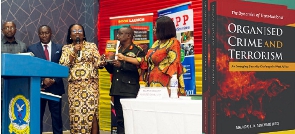 Book being launched by invited guests
Book being launched by invited guests
Globally, organized crime and terrorism are a major threat to human security
and development. They impede economic, social, cultural, and democratic developments, with a disproportionate effect on developing and fragile states. These criminal activities become more complex when family, ethnic, cultural, and historical elements are put into perspective.
As noted by the author and borrowing from Crime Theory, predatory crime occurs when a likely offender and a suitable target come together in time and place, without the presence of a capable guardian.
Criminal entrepreneurs will continue to look for opportunities while exploiting gaps in the system. We as guardians must therefore be equipped with the requisite knowledge and relevant tools. An understanding of the challenge and a solution to the above is now found in a book written by a renowned Ghanaian veteran.
A new book titled ‘The Dynamics of Transnational ORGANISED CRIME AND TERRORISM; An Emerging Security Challenge in West Africa’ was launched in both Accra and Kumasi in the early weeks of November 2013. The 490-page, 5-chapter book, was written by an industry practitioner, a researcher, and a retired senior officer of the Ghana Army, Major (Dr) Ebenezer Kwakye Agyemang (Rtd).
The book is published by EPP Bookshops, Ghana in collaboration with
Crossbridge Leadership Institute. The launch was attended by industry players and officials from Internal Security and Defence institutions, regulatory agencies, Ministries, Experts in Forensic Medicine, Regulatory Agencies, Economic and Organised Crime Offices, Embassies in Ghana, Academic and Research institutions including KAIPTC, universities, and Colleges, Ghana Military Academy, Ghana Armed Forces Command and Staff College, business leaders, veteran
and serving senior defence and security officers, institutions for politics, development, and resilience, and the general public.
The guests and speakers at the function underscored the relevant timeliness of the book given the disturbing trends in transnational organised crime and its relationship with terrorism.
The Executive Director of EOCO described the book as extremely exhaustive and particularly useful to the core mandate of her office. The Chief of Staff at the General Headquarters of the Ghana Armed Forces emphasized the relevance of the book to the training of personnel of the services. He recommended the book to personnel of the security services and beyond as the book exposes the grey lines between the mutually disturbing security challenge in Ghana.
The Director of Administration at the National Headquarters of the Ghana Police Service applauded the author for bringing the issues to the fore and adding further insight into the twin problem. The Minister of Foreign Affairs and Regional Integration on the other hand considered the book as an eye
opener, on the elusive nature of criminal enterprise in foreign relations.
The Minister of National Security also underscored the need to have the right information to deal with crime in general. In that light, he considered the book as very timely, relevant, and professionally delivered to cover the subject matter. The General Officer Commanding Northern Command on the other
hand was particular about the drift of organised crime and hybrid insurgency from the Sahel. He also considered the book as a ‘must have’ by all stakeholders and is relevant to the current trend of crimes.
Professor Paul Sampane Ossei, a Consultant Forensic Pathologist, highlighted a worrying trend between crime and some emerging sicknesses. He was of the view that the book be made compulsory reading material for any student so that we all get exposed to the disturbing issues.
In reviewing the book, Professor Emmanuel Kwesi Annin, the Director of the Faculty of Academic Affairs and Research at KAIPTC underscored the timeliness and relevance of the book. He added that the book exposes the reader to the problem and ends by suggesting some remedial measures. He commended the author for a good job done and noted that students of Ghana and West Africa now would have no excuse for lack of reading material on the subject.
According to the author, the book’s writing journey was hatched in 2007 in Liberia, where he was a Military Observer with the United National Mission in Liberia (UNMIL). Deeper research on the subject matter, however, took him about 9 years. Because of the book, he sponsored himself on courses and trainings in Europe, North Africa, and West Africa. This was aside from his experiences in the peacekeeping mission in 5 United Nations in West Africa, East Africa, and the Middle East and working with five multinational entities in the extractive sector.
Yes, writing the book was very arduous, and involving. But one thing that kept the author going was his focus and quest to contribute to knowledge. He intended to add a dynamic shift to finding solutions to the twin-disturbing challenge of transnational organized crime and terrorism.
Siding with the author, the reviewer and all who have perused the book consider it to be useful for all service and security personnel, all training institutions, development agents, internet communication practitioners, personnel in financial institutions, regulatory agencies, the penal institution, the judiciary, members of Parliament, persons in the mass media space including Radio and Television hosts, and students of politics. We cannot treat what we don’t know This book is therefore aimed at helping all of us understand the issues at stake.